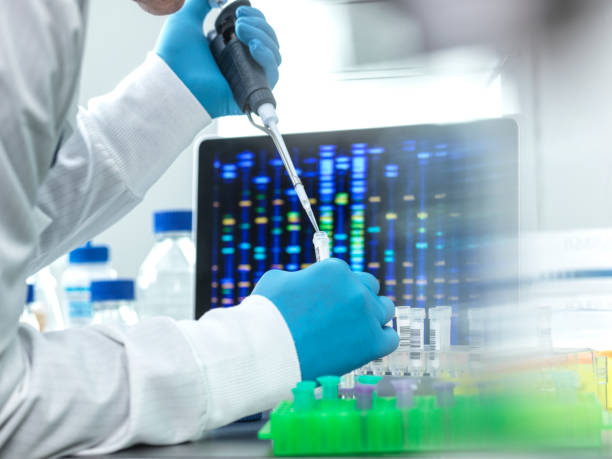Many people choose to undergo testing for carrier before or during pregnancy, to ensure that they know their chance of passing a defective gene to their kids. Labcorp has a range of screening tests for carriers, ranging from thorough testing of 500 disorders, to specific tests for particular conditions.
In the case of autosomal-recessive diseases such as cystic Fibrosis, if both parents carry it that child is at risk of having a 25% chance of inheriting two nonworking versions of the disease gene and thus being affected. The identification of the one that causes it requires meticulous selection of data.
Genetic Screening
Genetic testing focuses on genetic changes (also called variants) in chromosomes, genes, and proteins. They can cause harm effects, but also beneficial, neutral or uncertain consequences on the health risk.
Certain gene mutations inherited from parents can be linked to increased cancer risk and are included in a variety of commercial and home test for genetic hereditary cancer susceptibility conditions. People who receive a positive result may be sent to a genetic counselor who can provide guidance and/or referrals to other services to assess the risk of hereditary cancer and treatment.
Whether or when to offer the genetic test for hereditary disorders is a complicated option that requires a careful assessment of the advantages, risks, and costs of such services. Despite all the difficulties, the number of services for genetic testing continues to increase, such as Prenatal screening and preconception programs and population-based genetic screening for adult-onset disorders. It is important to ensure that the primary care provider has a clear grasp of the present state of knowledge about these tests to ensure they can discuss their use with their patients.

Disease Risk Assessment
Genetic tests are a way to determine the likelihood that an individual will be prone to specific conditions. The information can be extremely useful in the case of Mendelian illnesses, where one’s chance of developing the disease is directly linked to the presence of a disease-causing mutation.
As an example, if genetic test for a person shows they’re carriers of the cystic fibrosis gene mutation that they carry, they’ll have 50% likelihood of passing the mutation on to their children. If the children also possess the mutation are likely to have a high possibility of developing cystic-fibrosis themselves.
The results of the test can be utilized to inform the treatment of patients and to prevent them from needing it. If, for instance, an individual’s genetic mutation indicates they are susceptible to developing hereditary thrombophilia the test results can be utilized to determine the appropriate dosage of blood thinners, such as aspirin and Heparins. It can lower the chance of potentially fatal clots and reduce the chance of complications like deep vein thrombosis and pulmonary embolism. Tests can also detect certain cancer genes that are hereditary and can serve as a guide for personal risk-reduction strategies. This includes lifestyle modifications or medication as well as prevention surgeries such as mastectomy and lumpectomies.
Family Planning and Genetic Testing
Genetic testing may uncover mutations which can alter your odds to have a child who suffers from specific conditions like Tay-Sachs disease or cystic fibrosis. When these conditions arise, the father’s test results are also required. It is simple to test, using an swab of blood or cheek swabs. This test is done prior to when the time you are pregnant, which allows the possibility to investigate your options and make informed choices about your fertility.
The test can also be utilized to assess your risk for certain types of cancer, like inherited variants in PALB2 (breast as well as pancreatic cancer) or BRIP1 as well as RAD51C (ovarian cancer). Genetic counselors are able to review your family history and present the results of genetic testing.
Carriers screening is typically done for couples trying to have a baby, and they can reduce the chance of passing down a disease-related gene mutation to their children. If this is the case the egg or sperm donor is also tested, should it be there is a possibility. It can prevent conditions such as Tay-Sachs, cystic fibrosis, or sickle cell anemia.
Personalized Medicine using DNA Testing
Personalized medicine could include xet nghiem adn ha noi vietgen DNA testing for identifying disease-causing mutations. Tests can be performed in order to establish a diagnosis and identify if a patient carrying the disease or to determine if the patient is at a higher likelihood of developing this disorder.
A variety of heart-related conditions that are inherited like arrhythmias cardiomyopathy, familial hypercholesterolemia and coronary artery disease, have a genetic component that can increase the likelihood of developing the disorder. Knowing the genetic causes of these conditions can help guide treatment and family taking decisions about treatment.
A few DNA tests including multigene panels and exome sequencing can reveal genetic mutations that are not clinically actionable. They are often called incidental findings. At present, the federal law bans the health insurance industry from using DNA test results to deny people protection for long-term or even life treatment, however these rights don’t extend to all types of insurance. A group of doctors from the American College of Physicians has issued a position paper which examines the ways in which ethical integration of the use of precision medicine and genetic testing within clinical practice is done.
